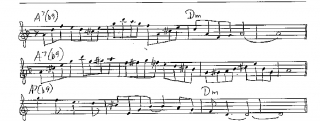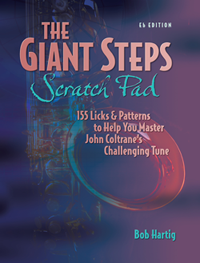Sooner or later, if you haven’t done so already as a jazz improviser, you”re going to want to broaden your harmonic palette with substitute dominant chords.
Say that term, substitute dominant, and what immediately springs to mind for most musicians is what is also refer to as a tritone substitute, so called because the root is a diminished fifth–a tritone–away from the root of the dominant seventh chord in any given key. For instance, let’s say you’re in the key of C major. The dominant of C is G7. In traditional theory, the G7 is a major/minor seventh chord.
If you drop down a tritone from the G7 and build another major/minor seventh chord, you wind up with a Db7. That is your tritone substitute, the most commonly used substitute dominant.
Note that the Db7 is just a half-step above your tonic chord, C major. Now, you could use a a Db Mixolydian mode with it. But another good choice would be a Db Lydian flat seventh scale–i.e. Db, Eb, F, G, Ab, Bb, Cb, and Db octave. Note that, as is so often the case, a single note makes all the difference. In this case, simply raising the fourth scale degree of the Db Mixolydian mode a half-step, from Gb to G, gives you the Lydian flat seventh scale.
Now, here’s where things get particularly interesting: let’s say you want to inject a little color with an altered dominant, a G+7(#9). That chord immediately suggests that you”ll use a diminished whole tone scale. Guess what? The diminished whole tone scale uses the same notes as the Lydian flat seventh scale; the only difference is, it starts on the G instead of the Db. So in this case, you can use the same scale for either the altered dominant or the substitute dominant! Nice, eh?
One of the earmarks of the tritone substitute is that it flipflops the third and the seventh, which are critical tones in the function of the dominant sound. The flat seventh of the V7 chord is the third of the bII7 chord, and vice-versa. This means that no matter which chord you use, dominant or substitute dominant, the tritone interval between the third and the fifth remains, with all its tension that demands resolution to the tonic chord.
Using the substitute dominant in a ii-V7-I progression gives you ii-bII7-I. You can also alternate the dom/subdom sound on your journey toward the I, thus: V7-bII7-I.
By the way, the tritone substitute is nothing new. In Bach”s day, it was called a Neopolitan chord. Jazz is deeply rooted in European harmony; the genius behind it lies, in part, in how African American musicians fused that harmony with tonal colors and rhythmic approaches that no Western musician would have dreamed of. Jazz truly is a distinctly American art form.



